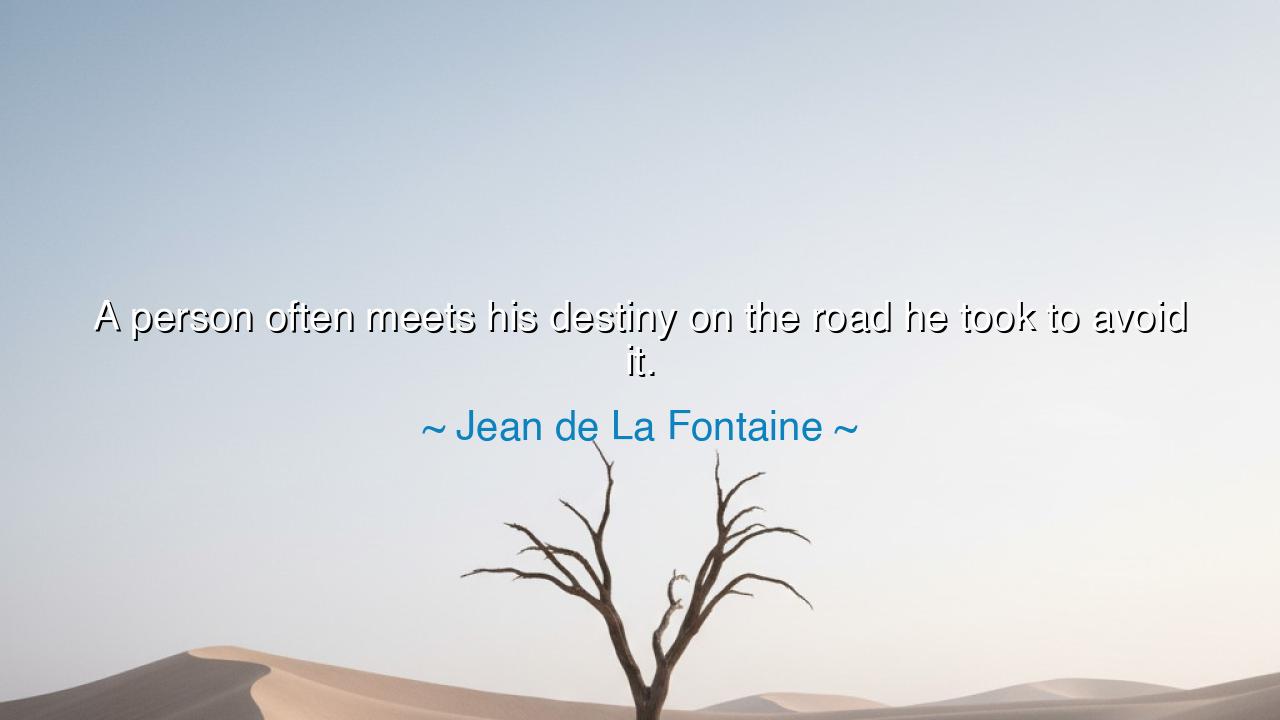
A person often meets his destiny on the road he took to avoid it.






"A person often meets his destiny on the road he took to avoid it." These words, spoken by the great Jean de La Fontaine, reveal the intricate dance between free will and fate, a dance that has captivated the minds of philosophers and thinkers for centuries. In this simple yet profound observation, La Fontaine suggests that our attempts to avoid destiny often lead us straight into its arms. There is a paradox in our lives: the harder we try to escape the inevitable, the more certain it becomes that we will encounter it. Our choices, driven by fear or desire to control the outcome, often guide us toward the very thing we sought to avoid, for destiny is not a distant force, but something woven into the fabric of our every decision.
In the ancient teachings of the Greeks, the concept of fate was personified by the Moirae, or the Fates—three sisters who controlled the thread of every human life. No matter how powerful a person became, they could not escape the Fates, for their destiny was set, yet their actions were the means by which they approached or resisted it. Oedipus, the tragic king of Thebes, is perhaps the most poignant example of this eternal struggle between destiny and free will. Despite the warnings of an oracle, Oedipus's attempt to avoid the prophecy—that he would kill his father and marry his mother—led him down a path that ultimately brought him face to face with it. His actions, meant to thwart his fate, were the very things that brought it to fruition. In the end, Oedipus’s destiny was not determined by his desires, but by the inevitable course of his life, a course he could neither control nor escape.
La Fontaine’s quote speaks to the human condition, where we often perceive the future as a force to be resisted or avoided. Consider the example of Jonah in the Old Testament, who sought to flee the call of God to go to Nineveh. He boarded a ship, hoping to escape the divine mission set before him. Yet, as the story unfolds, it is clear that no matter how hard Jonah tried to avoid his destiny, it was waiting for him at every turn. The storm he encountered and the great fish that swallowed him were not obstacles to be avoided, but the very means by which he was led to fulfill his destiny. His story reminds us that the more we struggle to escape what life has set before us, the more likely it is that we will meet it in ways we never imagined.
In our own lives, we often seek to avoid difficult choices, challenges, and the unknown future, hoping that by resisting, we can control the outcomes. But, like La Fontaine suggests, it is often in our resistance to fate that we bring ourselves face-to-face with it. The decisions we make to avoid certain paths are often the very decisions that lead us to the destiny we fear. Take the example of Mahatma Gandhi. Early in his life, Gandhi had little interest in the political struggles of India, and he sought a quieter life in law and academia. Yet, his personal journey—his experiences in South Africa and his growing sense of justice—led him, not away from, but directly into the struggle for Indian independence. In his case, it was his own journey to avoid a life of political leadership that ultimately drew him into it. His destiny was shaped by the very forces he thought he could escape.
This idea, however, does not merely serve as a cautionary tale but as a powerful teaching about embracing life’s flow rather than struggling against it. Resisting fate, in the manner of Oedipus or Jonah, may bring pain and frustration, but in the acceptance of one’s path, we often find peace and purpose. Socrates, the great philosopher, spent his life searching for truth and wisdom without the desire for fame or reward. His destiny, as foretold, was to die for his beliefs. Despite his efforts to engage the world with reason and logic, his fate—his meeting with death—was not avoided but accepted. Socrates’s peace came from understanding that the pursuit of truth and virtue would lead him to the ultimate end, and he walked toward his fate with courage, embracing it as a part of his mission rather than something to fear.
The lesson La Fontaine offers is not one of hopelessness, but of wisdom: fate cannot be outrun, but it can be met with grace and understanding. The struggle to avoid the inevitable often causes more anguish than acceptance. Our decisions do indeed shape our path, but ultimately, the force of destiny is shaped by the greater arc of our lives, one we cannot always predict. Instead of running from the challenges that lie before us, we must learn to embrace them, to understand that each step, even those we resist, is a part of the unfolding story that is uniquely ours.
So, my dear listener, as you face the unknown future, remember this wisdom: do not fear what is to come, for the more you struggle to avoid it, the more you may find yourself caught by it in ways you never expected. Instead, walk with courage and acceptance, knowing that each decision, each action, is a step toward the destiny you are meant to fulfill. Let the future unfold not through the force of resistance, but through the strength of your acceptance of the path set before you. And in that, you will find the peace that comes from living in harmony with the flow of life itself.






AAdministratorAdministrator
Welcome, honored guests. Please leave a comment, we will respond soon